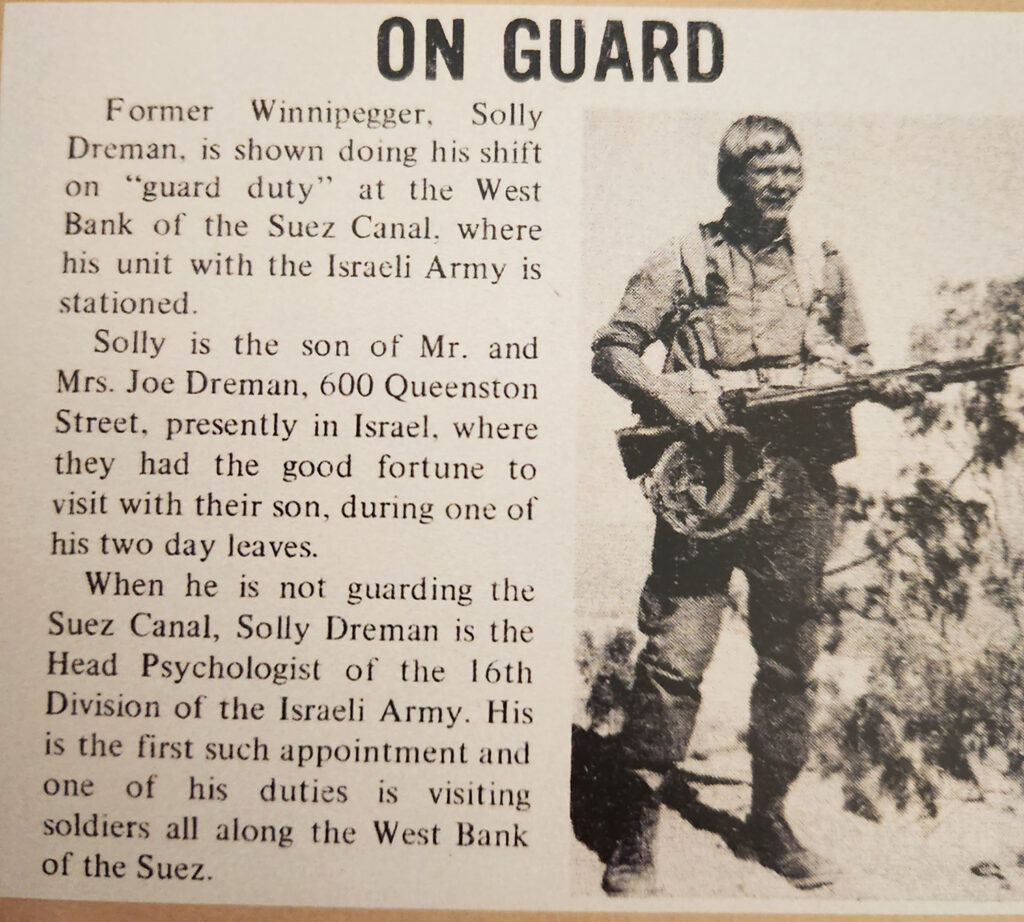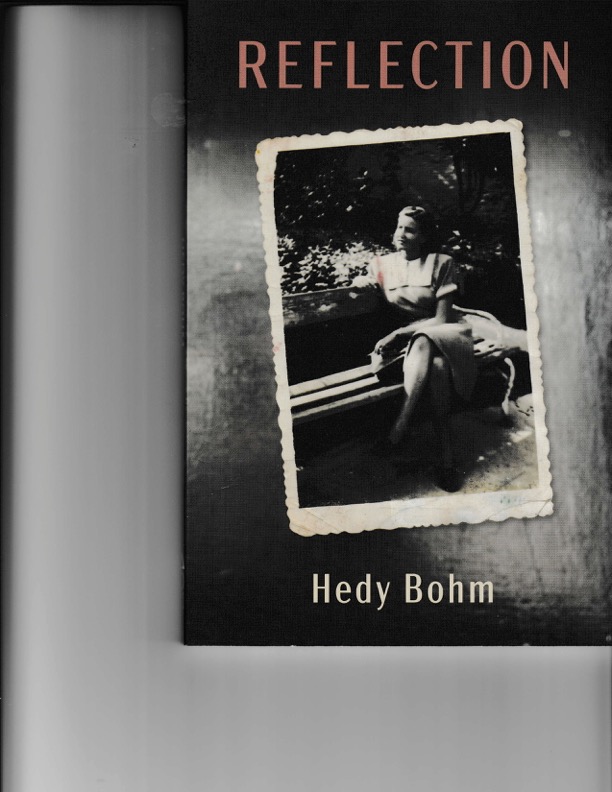Features
A Winnipeger at heart speaks from the heart from Jerusalem: Solly Dreman, Ph.D.

Posted Oct. 31, 2023 By SOLLY DREMAN Israel is faced today with a crisis of historical proportions with a threat not only to its existence but to the free democratic world at large. The horrendous events of Shabbat October 7th in which 1400 citizens, men, women and children and infants were slaughtered, decapitated and raped, 3400 injured and 239 taken hostage in Gaza or declared missing has shocked the nation, shaken Israeli citizens’ confidence and is threatening not only Israel but the free democratic world .
There is no question that this was a genocide of historical proportions and an act of pure evil designed like the Holocaust to ultimately exterminate the Jewish people world-wide. This is the professed aim of Jihad, but the reactions of the international community extend beyond Islam and the cries of the woke international community for “the massacre of the massacred” echoed in recent mass demonstrations, hate crimes, support of leading university administrators and their students is unforgivable. Even more shocking is the support of so called liberal progressive Jews, even rabbis, against Israel in support of a “Free Palestine”.
As a Winnipegger who made Aliyah to Israel in 1964 and has been a part of the main stream of Israel’s life as a clinical psychologist dealing with central issues in Israel like war and terrorism, immigration, death and dying and families in crisis, I have been exposed to some of the main streams in Israel’s development. I am proud of being an Israeli and being part and parcel of this young, dynamic, nation state. I am, however, deeply concerned with the fate of our nation, which is the ultimate saferoom for the Jewish people in times of crisis.
As a Winnipegger I am very proud of my origins and even wrote a book: “A Personal Odyssey:
From Winnipeg to Jerusalem” (link attached). Winnipeg is a great supporter of Israel and in the Yom Kippur War in 1973 donated more per capita than any other city in North America. Bernie Bellan just wrote me that in the current war efforts Winnipeg has raised over 3.6 million dollars for Israel’s war efforts, which is indeed commendable. In these fateful days Israel badly needs the continued and unconditional support of world Jewry. Knowing Winnipeg’s Jewish community well I am certain Israel can count on its continuing support for Israel as the continuing homeland for world Jewry.🙏

Solly Dreman made Aliyah to Israel in 1964. He is a Fulbright Scholar (University of California Medical School, 1977) and Professor Emeritus in Clinic Psychology at Ben Gurion University of the Negev. He was the Brigade Psychologist of the Jerusalem Brigade on the Suez Canal in the Yom Kippur War in 1973
Post script: I asked Solly whether, given his extensive experience as a psychologist, he could offer any tips to Israelis that might help them in the current situation. Here is what he wrote back:
1. Unprecedented rates of volunteering on the home front such as offering psychological assistance, hosting refugee families from the south and north, providing food and clothing for both civilians and soldiers, etc. Being active is therapeutic and diminishes self concern and anxiety.
2. The media: Too much exposure, particularly to graphic portrayals of violence exacerbates anxiety. Too little exposure and lack of information also promotes uncertainty and anxiety. Need a moderate level of exposure.
3. Social support as displayed in whatsapp groups, zoom meetings, meetings with friends when exposure to threat is minimal are important and prevalent.
4. Parents, should present their children a confident but not invincible stance like “For sure we will win!”. They should not be afraid to admit that they are also anxious because this will prevent their children from expressing their emotions.
5. Information about victims on the home and battle front should be conveyed to children and family at large because, particularly in Israel, war and grief are intimate and the facts on the warfront will ultimately be revealed. Failure to disclose realities on the ground will create a confidence gap.
6. Routine and activity should be encouraged such as physical activity, school when there are adequate safe rooms and family and social visits when the security situation permits.
7. Contact with families of victims is important. As a brigade psychologist in the Yom Kippur War many families complained that friends avoided them because it was difficult for them to confront death and dying. This was very painful for deceased families
Features
New autobiography by Holocaust survivor Hedy Bohm – who went on to testify in trials of two Nazi war criminals

Book Review by Julie Kirsh, Former Sun Media News Research Director
My parents were Hungarian Jewish Holocaust survivors who arrived in Toronto in 1951 without family or friends. In the late 50s my mother met Hedy Bohm outside of our downtown apartment and quickly connected with her. Both women had suffered the loss of all family in the Shoah. Over the years our families’ custom became sharing our dining table with the Bohm family for the Jewish high holidays. The tradition continues today with the second generation.
Hedy was born in 1928 in the city of Oradea in Romania. She was a pampered only child, adored by her father and very much attached to her mother. Although Hedy was an adolescent, she was kept from hearing about the rising anti-semitism around her in her hometown. She was protected and sheltered like any child. Memoirs from other adolescents like Elie Wiesel, aged 15 in Auschwitz, Samuel Pisar, liberated at 16, and Rabbi Israel Meir Lau, who was found in Buchenwald by American soldiers at age 8, made me wonder about the resilience and strength of children who survived like Hedy.
Hedy was only 16 years old when she walked through the gates of hell, Auschwitz-Birkenau. Hedy’s poignant retelling of this pivotal moment in her young life was the sudden separation from her father and moments later from her mother. Somehow Hedy’s mother got ahead of her upon their arrival at Auschwitz. Hedy called out to her. Her mother turned and they looked at each other. A Nazi guard prevented Hedy from joining her mother. Hedy has always been tormented by this moment of separation. Did her mother know that she was walking to her death?
Hedy writes that she was focused on survival in the camps. She concentrated on eating whatever food was given and keeping clean by washing daily in icy, cold water before the roll call. When she contracted diarrhea, she remembered her mother’s homemade remedy of gnawing on charred wood. Her naivete and innocence were overcome with a strong inner determination to stay alive so that she could see her mother again.
Hedy recounts the terrible hunger that everyone endured. One day, spotting some carrots in a warehouse, Hedy was appointed by her aunt to run and grab what she could. Luckily she evaded the armed guard who would have shot her on the spot.
On April 14, 1945, Hedy’s day of liberation, she learned the terrible fate of her mother. The return home for the survivors was a further tragedy when they realized the loss of family and community.
In her memoir, Hedy describes meeting Imre, an older boy from her town whom she eventually married. Their flight from Romania to Budapest to Pier 21 in Halifax to Toronto is documented in harrowing detail.
Hedy recounts how in Toronto no one wanted to know the stories of the survivors. This was a world before Eichmann’s trial in Israel in 1961 and the TV series, The Holocaust, in 1978. The floodgates for information from the survivors opened late in their lives.
In Toronto, after many failed enterprises, Imre and Hedy stumbled onto the shoe selling business. In 1959, they leased a small shoe store close to Honest Ed’s in downtown Toronto. Surprisingly, the business according to Hedy, became very profitable. Many years later, after Imre’s sudden death due to a heart attack, Hedy continued to manage their shoe business while taking care of her daughter, Vicky and son, Ronnie.
In 1996, Hedy was introduced to Rabbi Jordan Pearlson. Their love match made Hedy feel that she had been given a wonderful gift, late in life, which she welcomed.
Jordan died in 2008. Hedy endured and carried on with yoga and tai chi both as a teacher and devoted practitioner.
A new purpose in life opened up for Hedy when she was invited to be a speaker for the Holocaust Education Centre (now the Toronto Holocaust Museum). She spoke to mostly non-Jewish students whom she visited at their schools outside of Toronto.
Visiting Auschwitz with the March of the Living for the first time in 2010, Hedy faced her fears about returning to the place that held the horrors. She was fortunate to meet Jordana Lebowitz, a student from Toronto who developed a multimedia presentation called ShadowLight. Hedy’s contribution to teaching others about the Holocaust by sharing her experience, is immeasurable.
In 2014, Hedy was asked to be a witness at the trial of Oskar Groning , “the accountant of Auschwitz”, in Germany. In 2016, she appeared as a witness for the trial of the Nazi guard, Reinhold Hanning. He was sentenced to a mere five years in prison and Groning died before he could start his jail sentence. In having the courage to participate in these war criminal trials, Hedy spoke for her parents and all the innocents who could not speak for themselves.
Hedy’s talks to students always include an admonishment to be kind, to trust in themselves and work for the greater good. She rose above her own fears of sharing her story by speaking publicly.
Hedy’s story of survival and perseverance will remain a beacon to future generations, ensuring that hope and good will endure even in the worst of times.
Reflection
by Hedy Bohm
Published in 2026 by The Azrieli Foundation
To order a copy of the book go to https://memoirs.azrielifoundation.org/titles/reflection/
Features
Optimizing mobile wagering convenience with bassbet casino

The rise of mobile technology has transformed the way people engage with betting platforms. In this digital era, bassbet has emerged as a frontrunner in optimizing mobile experiences for casino enthusiasts. This article explores how bassbet casino is enhancing mobile wagering convenience.
Mobile technology has revolutionized the betting industry, providing users with unprecedented convenience and accessibility. Bassbet casino has capitalized on this trend by offering a seamless mobile wagering experience. By integrating user-friendly features and cutting-edge technology, the platform ensures that it is both accessible and engaging for users on the go.
Enhancing user experience with mobile technology
Bassbet casino leverages the latest mobile technology to enhance user experience. The platform’s intuitive design and easy navigation make it simple for users to place bets from their mobile devices. This focus on user experience ensures that players can enjoy their favorite games without any hassle.
Furthermore, the platform offers a wide range of games optimized for mobile play, ensuring that users have access to the same variety and quality as they would on a desktop. This adaptability is crucial in maintaining user engagement and satisfaction, as it allows players to enjoy their gaming experience anytime, anywhere.
The responsive design philosophy adopted by the platform ensures that every element of the platform scales perfectly across different screen sizes and device types. Whether users are accessing the casino through smartphones or tablets, the interface automatically adjusts to provide optimal viewing and interaction. This technological sophistication extends to touch-optimized controls, swipe gestures, and quick-loading graphics that minimize data consumption while maximizing visual appeal. The platform also incorporates intelligent caching mechanisms that remember user preferences and frequently accessed games, creating a personalized mobile environment that becomes more intuitive with each visit.
Security and reliability in mobile wagering
Security is a top priority for bassbet casino, especially when it comes to mobile wagering. The platform employs advanced security measures to protect user data and ensure safe transactions. This commitment to security builds trust among users, making it a reliable choice for mobile betting.
In addition to security, the company focuses on providing a reliable and stable platform. The casino’s mobile interface is designed to handle high traffic and deliver a smooth gaming experience, minimizing disruptions and ensuring that users can enjoy uninterrupted play.
Innovative features for mobile users
The company continuously innovates to offer unique features tailored for mobile users. From personalized notifications to exclusive mobile promotions, the platform ensures that its mobile users receive a premium experience. These features not only enhance user engagement but also encourage loyalty among players.
By staying at the forefront of mobile technology, the platform remains a leader in the online betting industry. Its commitment to optimizing mobile wagering convenience sets it apart from competitors, making it a preferred choice for casino enthusiasts worldwide.
Features
Why People in Israel Can Get Emotionally Attached to AI—and How to Keep It Healthy
Let’s start with the uncomfortable truth that’s also kind of relieving: getting emotionally attached to a Joi.com AI isn’t “weird.” It’s human. Our brains are attachment machines. Give us a voice that feels warm, consistent, and attentive—especially one that shows up on demand—and our nervous system goes, “Oh. Safety. Connection.” Even if the rational part of you knows it’s software, the emotional part responds to the experience.
Now, if we’re talking about Jewish people in Israel specifically, it’s worth saying this carefully: there isn’t one “Jewish Israeli psychology.” People differ wildly by age, religiosity, community, language, politics, relationship status, and life history. But there are some real-life conditions common in Israel—high tech adoption, a fast-paced social environment, chronic background stress for many, and strong cultural emphasis on connection—that can make AI companionship feel especially appealing for some individuals. Not because of religion or ethnicity as a trait, but because of context and pressure.
So if you’ve noticed yourself—or someone you know—getting attached to an AI companion, the goal isn’t to panic or label it as unhealthy by default. The goal is to understand why it feels good and make sure it stays supportive rather than consuming.
Why attachment happens so fast (the psychology in plain language)
Attachment isn’t just about romance. It’s about regulation. When you feel seen, your body calms down. When you feel ignored, your body gets edgy. AI companions can offer something that’s rare in real life: consistent responsiveness. No scheduling. No misunderstandings (most of the time). No “I’m too tired to talk.” Just a steady stream of attention.
From an attachment perspective, that steadiness can act like a soft emotional “hug.” For someone with anxious attachment, it can feel like relief: finally, a connection that doesn’t disappear. For someone with avoidant tendencies, it can feel safe because it’s intimacy without the risk of being overwhelmed by a real person’s needs. For someone simply lonely or stressed, it can feel like a quiet exhale.
And unlike human relationships, AI won’t judge your worst timing. You can message at 2:00 a.m., when your thoughts are loud and the apartment is silent, and you’ll still get an answer that sounds caring. That alone is powerful.
Why it can feel especially relevant in Israel (for some people)
Israel is a small country with a big emotional load for many people—again, not universally, but often enough that it shapes daily life. A lot of people live with a background hum of stress, whether it’s personal, economic, or tied to the broader environment. When life feels intense, the appeal of a stable, gentle interaction grows. Not because you’re fragile—because you’re tired.
Add a few more very normal realities:
High tech comfort is cultural. Israel has a strong tech culture. People are used to tools that solve problems quickly. If you’re already comfortable with digital solutions, trying an AI companion doesn’t feel like a strange leap.
Time is tight. Between work, family responsibilities, reserve duty for some, long commutes, or simply the pace of urban life, many people don’t have the energy for long, messy social processes. AI can feel like connection without the logistics.
Social circles can be both close and complicated. Israeli society can be community-oriented, which is beautiful—until it’s also intense. In tight-knit circles, dating and relationships sometimes come with social pressure, opinions, and “everyone knows everyone.” A private AI chat can feel like a relief: no gossip, no explanations, no performance.
Language and identity complexity. Many Jewish Israelis move between languages and cultures (Hebrew, Russian, English, French, Amharic, Arabic for some). AI chat can become a low-stakes space to express yourself in the language you feel most “you” in—without feeling judged for accent, vocabulary, or code-switching.
None of this means “Israelis are more likely” in any absolute sense. It means there are situational reasons why AI companionship can feel particularly soothing or convenient for some people living there.
The good side: when AI attachment is healthy
Emotional attachment isn’t automatically a problem. Sometimes it’s simply a sign that something is working: you feel supported. You feel calmer. You’re expressing yourself more. You’re practicing communication instead of shutting down. You’re less likely to make impulsive choices from loneliness.
Healthy use often looks like:
You feel better after chatting, not worse.
You can still enjoy your real life—friends, work, hobbies, family.
You don’t hide it in shame; you just treat it like a tool or pastime.
You use the AI to practice skills you bring into real relationships: clarity, boundaries, confidence, emotional regulation.
In that version, AI companionship is closer to journaling with feedback, or a comforting ritual—like a cup of tea at the end of the day, not a replacement for dinner.
Where it can slip into unhealthy territory (quietly)
The danger isn’t “having feelings.” The danger is outsourcing your emotional world to something that will never truly share responsibility.
Warning signs usually look like:
You cancel plans with humans because the AI feels easier.
You feel anxious when you’re not chatting, like you’re missing something.
You start needing the AI to reassure you constantly.
Your standards for human relationships collapse (“Humans are too complicated, AI is enough”).
You feel a “crash” after chatting—more lonely, more restless, more disconnected.
The biggest red flag is when the AI becomes your only reliable source of comfort. That’s not because AI is evil. It’s because any single source of emotional regulation—human or non-human—can become a dependency.
How to keep it healthy (without killing the fun)
Here’s the approach that works best: don’t ban it, contain it.
Give it a role.
Decide what the AI is for in your life: playful flirting, stress relief, practicing communication, roleplay, bedtime decompression. A defined role prevents the relationship from becoming vague and all-consuming.
Set a “time container.”
Not as punishment—just as hygiene. For example: 20 minutes at night, or during commute time, or only on certain days. Ending while you still feel good is the secret. Don’t chat until you feel hollow.
Keep one human anchor active.
A friend you text, a weekly family dinner, a class, a gym routine, a community event—something that keeps your real social muscles moving. In Israel, community can be a huge protective factor when it’s supportive. Use it.
Use consent and boundary language even with AI.
It sounds odd, but it trains your brain in healthy dynamics:
“Slow down. Keep it playful, not intense.”
“No jealousy talk. I don’t like that vibe.”
“Tonight I want comfort, not advice.”
If you can do that with an AI, you’ll be better at doing it with humans.
Watch the “replacement” impulse.
If you catch yourself thinking, “I don’t need anyone else,” pause and ask: is that empowerment—or is it avoidance? Sometimes it’s a protective story your brain tells when it’s tired of disappointment.
Check in with your body after.
Not your thoughts—your body. Calm? Lighter? More grounded? Good sign. Agitated? Empty? Restless? Time to adjust.
And if you’re noticing that AI use is feeding anxiety, sleep problems, isolation, or obsessive thinking, it may help to talk to a mental health professional—especially someone who understands attachment patterns. That’s not a dramatic step. It’s basic self-care.
People in Israel—Jewish Israelis included—can get attached to AI for the same reason people everywhere do: it offers consistent attention in an inconsistent world. Add the local realities of stress, pace, and social complexity, and it can feel even more comforting for some individuals. The healthiest path isn’t to judge yourself for it. It’s to use it intentionally, keep your human life active, and treat the AI as a supportive tool—not the center of your emotional universe.


